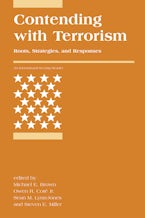An important, thoughtful and, above all, reasoned book about how we can adapt the laws of war and the laws of crime to fashion a responsible and effective response to the terrorist threat. In a book devoid of ideological flag waving Blum and Heymann meticulously deconstruct the arguments of necessity and provide hope that a well-led democracy can counter terrorism effectively by forging principled compromises without compromising fundamental values.
Louise Richardson, Principal and Vice-Chancellor, University of St. Andrews
Blum and Heymann weave together the incisive legal reasoning and strategic thinking essential to protecting both liberty and security. At a time when heated political rhetoric risks drowning out constructive dialogue, they offer the serious thinking needed for just and effective counterterrorism law.
Matthew C. Waxman, Associate Professor, Columbia Law School, Principal Deputy Director of Policy Planning, U.S. Department of State, 2005–2007
Professors Blum and Heymann have written a comprehensive and insightful study of the legal challenges raised in a post-9/11 world. Some readers (including me) will disagree with particular conclusions, but everyone should agree that the authors have laid out the dimensions of these issues clearly and fairly.
Michael Chertoff, Chairman, The Chertoff Group, Secretary of Homeland Security, 2005–2009
This is an excellent work, with highly creative proposals and sensitive analysis. The most important task in the wars on terror will be the mutual adaptation of strategy and law in order to provide a legitimate basis on which such wars can be fought. It is to this end that Heymann and Blum have made a major contribution.
Philip Bobbitt, Herbert Wechsler Professor of Jurisprudence and Director of the Center on National Security, Columbia Law School, and Distinguished Senior Lecturer, University of Texas

Winner, 2010 Chicago-Kent College of Law/Roy C. Palmer Civil Liberties Prize











